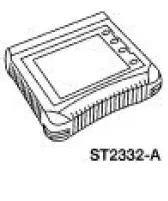Ford Mustang (1999-2004) Service Manual: Canister Vent Solenoid Closing Procedure
Special Tool(s)
 |
Worldwide Diagnostic System (WDS) 418-F224, New Generation STAR (NGS) Tester 418-F052, or equivalent scan tool |
CAUTION: The canister vent solenoid must not be energized for more than nine minutes at one time. Once the canister vent solenoid is energized and de-energized, adequate time must be allowed for the component to cool adequately. Failure to allow the component to cool may create a false failure in the diagnostics, causing unnecessary repairs.
1. Connect the scan tool and select the output test mode.
2. If PID monitors are not active, select PIDs.
3. Select the fuel tank pressure (FTP) and the volts (V) parameter identification (PID) for monitoring.
4. Select the ALL OFF mode.
5. Close the canister vent solenoid by pushing the START button on the scan tool.
 Pinpoint Tests
Pinpoint Tests
NOTE: Reinstall or install new evaporative emission hose clamps
removed or damaged during testing
procedures.
PINPOINT TEST A: DTC P0442 SMALL LEAK IN EVAP SYSTEM
Test Step
Result / Action to ...
 Evaporative Emission System Leak Test
Evaporative Emission System Leak Test
Special Tool(s)
Evaporative Emission System
Tester 310-F007
(134-00056) or equivalent
Worldwide Diagnostic System
(WDS)
418-F224,
New Generation STAR (NGS)
Tester
...
Other materials:
Brake Caliper - Cobra
Removal
1. Raise and support the vehicle.
2. Remove the tire and wheel assembly.
3. Remove the caliper locating pin E-clip.
4. Remove the caliper locating pin.
5. Remove the front brake flow bolt.
6. Remove the caliper.
7. Remove the brake pa ...
Acceleration Control (Diagnosis and Testing)
Inspection and Verification
1. Verify the customer's concern by operating the acceleration control system
to duplicate the
condition.
2. Inspect to determine if any of the following mechanical concerns apply:
Visual Inspection Chart
Mechanical
...
Closing the convertible top
Note: The convertible top will not operate unless the vehicle is
stationary or traveling under 3 mph (5 kmh).
Note: Make sure that the latch handles are pulled down and in the fully
opened position before the top makes contact with the windshield
header. This ...
